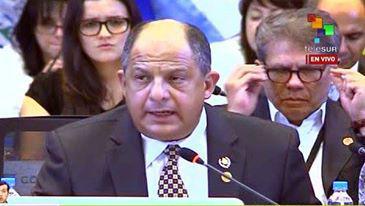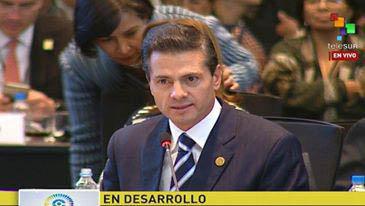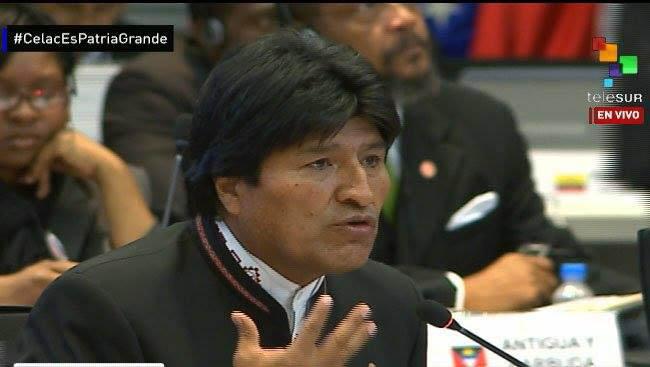
The President of Costa Rica, Luis Guillermo Solís, speaking during the IV CELAC Summit in Quito this January 27, referred to gender equality in the region, noting that challenges in terms of women’s inclusion in the productive sphere remain, while stressing that the issue goes beyond economics. He highlighted that the UN and CELAC countries have developed a gender agenda which seeks to address discrimination.
The President also recalled the words of Venezuelan President Nicolás Maduro, during a private meeting, in which he said that “the efforts of CELAC should be aligned with the 2030 Agenda.”
MEXICO

Meanwhile, Mexican President Enrique Peña Nieto stated that his country is supporting Colombia in its process toward peace. He reiterated the interest and commitment on the part of Mexico to continue strengthening CELAC, noting that one of the main strengths of Latin America and the Caribbean is its diversity.
Peña Nieto noted that in recent years, the region has achieveddynamic economic growth, with an annual average regionalGDP growth of3.7%, which has translated to socialdevelopment.
BOLIVIA

Bolivian President Evo Morales referred to the founding of CELAC in response to the need to bring the countries of Latin America and the Caribbean together to work toward their definitive liberation.
He congratulated Colombian President Juan Manuel Santos for his efforts toward peace in Colombia, stating, “Our greatest asset is peace.”
Morales also spoke of the need to change economic and social policies in order to ensure peace, social justice and basic public services, which, he said, are a human right. He also stated that natural resources should be in the hands of the people, in collaboration with the state, and posed the question as to why the region is so underdeveloped when it has so many natural resources.
COLOMBIA
For his part, Colombia President Juan Manuel Santos, expressed thanks to CELAC member countries for their support of the Colombian peace process.
He referred to a number of important current issues, such as the advance of the Zika virus, the peace process and the fight against drug trafficking, but stressed that the most pressing issue for the region today is poverty.
Economic crises affect all citizens but especially the poorest so we must protect the most disadvantaged and vulnerable, Santos added. He noted that unemployment is a huge social problem for Latin America and that therefore we must work toward its eradication.
Despite the global economic crisis, Santos urged countries not to cut social programs, however he also spoke of the intelligent austerity policy applied in Mexico, which he claimed aims to strike a balance between cuts and the needs of the people, in order that the most disadvantaged do not suffer.
CHILE
The President of Chile, Michelle Bachelet, began her speech by highlighting that in four years, this forum has managed to strengthen the unity and political, economic and social integration of the region. She added that the regional bloc seeks to advance integration based on convergence in diversity.
Bachelet stressed that Chile orients its participation in the body from an inclusive perspective. It is our responsibility to achieve growth within our borders, but also in the Community, she said.
She referred to current efforts in her country toward a new constitution that truly represents the interests of Chileans, and stated that they have made progress in reducing extreme poverty. She added that the region is seeking the path to achieving solid growth and diversifying economies, while highlighting the challenges faced by small island countries.
PANAMA
Panamanian President Juan Carlos Varela highlighted the strength of multilateralism, and noted that global problems require global solutions. He welcomed the decision of the United Nations Security Council regarding the Colombian peace talks. Panama is a nation committed to peace and human rights, he stressed, noting that we must redouble efforts to stop drug trafficking and organized crime, while supporting Central American countries with economic resources.
Varela said that member countries have committed to establishing a Development Center. He recalled the Summit of the Americas, and the historic rapprochement between Cuba and the United States, noting that as a region we must continue to support these efforts, while strengthening CELAC itself as a means for further integration of Latin America and the Caribbean.
GUATEMALA
Guatemalan President Jimmy Morales stated that it was a great honor that his first participation in an international event be as part of the IV CELAC Summit, which brings together leaders of the region. He congratulated Juan Manuel Santos, President of Colombia, and its people for their commitment to peace and progress to reach a solution to the armed conflict, for which they have the support of Guatemala.
He added that his aim is to work for a better country, following the integrationist spirit of CELAC, to achieve long-term sustainable development.
VENEZUELA
President of Venezuela, Nicolás Maduro, stated that the Community of Latin American and Caribbean States is consolidating itself, based on the experiences of our peoples following their many struggles for social justice and integration.
He noted that the tougher economic situation today requires a greater commitment to work together to stimulate our economies and protect social programs. Maduro also called on the United States to put an end to the economic, commercial and financial blockade of Cuba.
He stressed that the key achievement of CELAC has been to unite in diversity.








